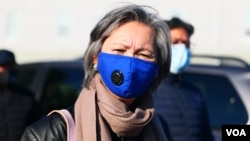Former CNRP Vice President Mu Sochua is certain to miss her trial on January 14 for incitement and conspiracy charges after the Cambodian government has not issued her a visa and COVID-19-related flight cancelations have complicated her planned return.
The former party vice president had announced a plan to return this week but posted on Facebook that she had to delay her flight because the airline canceled the flight. She said that she would now take a flight on January 16 from Los Angeles, U.S., and arrive in Cambodia on January 17 at 05:35 p.m.
A major obstacle to Mu Sochua’s return is the cancelation of her Cambodian passport in 2019, which means she will require a visa on her American passport before departure.
But, the Cambodian consulate in Massachusetts, U.S., and the embassy in Washington D.C. had not responded to her visa application, she said.
“I have not received any visa as of now,” Mu Sochua said Monday morning. “I did attempt to apply for Visa K but the consulate in Lowell [in the U.S.] has not responded whether I would obtain one.”
“I think you should refer this question to Hun Sen’s government but I have completed what I am required to.”
Sochua said she was planning to return with less than ten former party members. Government and Cambodian People’s Party officials have said that former CNRP members are free to return to Cambodia but have not addressed the government’s attempts to proactively block these efforts.
The Cambodian government canceled passports for 39 former CNRP members during their last attempt to return to the country in late 2019. The dissolved party said this was a violation of their constitutional right to return to the country and has called for the reinstatement of passports.
Foreign Ministry Spokesperson Koy Kuong, at the time, told RFA Khmer that the cancelation of passports was done because former CNRP members had fled legal responsibility in Cambodia and urged them to return.
The former party vice president said she was aware of the risks of her returning to Cambodia, but said she had a right to come back.
“Even if I am arrested, I am ready for it but please respect my constitutional rights as a Cambodian citizen to due process, as a defendant with the opportunity and right to present myself before the court to defend my case,” she said.
This K-class visa is reserved for those of Cambodian descent who hold a foreign passport, according to a sub-decree on visa issuance put into effect in 2016, adding that applicants can either apply online or on arrival in Cambodia. Visa K holders can stay in Cambodia until their passport expires.
New COVID-19 restrictions discontinued the visa-on-arrival and electronic visa application processes, requiring applicants to make an in-person application at Cambodian embassies or consulates before boarding a flight.
Mu Sochua had previously attempted to join former party president Sam Rainsy in a planned return in November 2019, but airlines were ordered by the Hun Sen government to not ferry them into Cambodia.
Sin Chansereyvutha, a spokesperson for the State Secretariat for Civil Aviation, said that the government had not placed any restrictions this time around.
“There is no such instruction to airlines to not allow [Mu Sochua] to board; there is no such ban,” Sin Chansereyvutha said. “But how can she possibly enter Cambodia because I heard that she wasn’t issued a visa.”
Phnom Penh International Airport Director Sao Wathana said Mu Sochua would not be allowed to board any flight to Cambodia without a valid visa.
“As a general process, the airline company will not allow boarding [without a visa] and they would deny check-in because they will only allow people with visas,” Wathana said.
Interior Ministry Spokesperson Khieu Sopheak declined to comment and Foreign Ministry Spokesperson Koy Kuong could not be reached on Monday.
The Interior Ministry’s Deputy General Director of Immigration, Keo Vanthan, said that if Mu Sochua set foot in Cambodia illegally, relevant legal action would be taken against her.
“As a matter of fact, anyone entering Cambodia illegally will be dealt with legal measures, regardless if they are Mu Sochua or whoever,” said Vanthan.
In 2019, Sam Rainsy and supporters wanted to enter Cambodia through the Poipet border crossing but the opposition leader was allegedly not allowed to board a flight to Bangkok, Thailand, due to the ban on his entry into Cambodia. He and other former CNRP members spent a few days in Malaysia but were unable to return to Cambodia.
Mu Sochua and some of her colleagues were attempting to return for a massive trial against more than 130 former CNRP members and supporters that will be held this year. Around 40 individuals, including Mu Sochua and Sam Rainsy, will be tried on January 14, whereas the remaining face trial on March 4.
Mu Sochua fled Cambodia in 2017 after the then-party president, Kem Sokha, was arrested on treason charges. Shortly after her departure, the party was dissolved by the Supreme Court in November 2017, and 118 of its senior members were banned from political activity.










